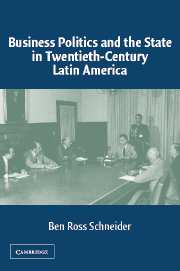Book contents
- Frontmatter
- Contents
- List of Tables
- List of Abbreviations
- Acknowledgments
- PART I INTRODUCTION AND ARGUMENTS
- 1 Patterns of Business Politics in Latin America
- 2 States and Collective Action
- PART II CASES AND COMPARISONS
- PART III IMPLICATIONS AND CONCLUSIONS
- Appendix A Background Information on Major Business Associations
- Appendix B Interviews
- Appendix C Conversions
- References
- Index
1 - Patterns of Business Politics in Latin America
Published online by Cambridge University Press: 23 November 2009
- Frontmatter
- Contents
- List of Tables
- List of Abbreviations
- Acknowledgments
- PART I INTRODUCTION AND ARGUMENTS
- 1 Patterns of Business Politics in Latin America
- 2 States and Collective Action
- PART II CASES AND COMPARISONS
- PART III IMPLICATIONS AND CONCLUSIONS
- Appendix A Background Information on Major Business Associations
- Appendix B Interviews
- Appendix C Conversions
- References
- Index
Summary
A landed interest, a manufacturing interest, a mercantile interest, a moneyed interest with many lesser interests grow up of necessity in civilised nations and divide themselves into different classes actuated by different sentiments and views. The regulation of these various and interfering interests forms the principal task of modern legislation and involves the spirit of party and faction in the necessary and ordinary operations of government.
James Madison, 1788Variations in Business Organization
Patterns of business organization and relations between business and government varied widely across Latin America in the twentieth century. Coffee provides an early and illustrative example. By the middle of the twentieth century, Brazil and Colombia were the largest coffee producers in Latin America and coffee generated most of their export revenues, yet the economic and political organization of coffee growers in the two countries differed remarkably. The Colombian coffee sector had by the 1960s been thriving for decades and pulling much of the rest of the economy along with it. The association of coffee growers, Federacafe (Federación Nacional de Cafeteros de Colombia), had firmly established Colombian coffees in the high-quality, high-price segments of the world market, and coffee overall accounted for over two-thirds of Colombian exports. The political power of the coffee elite and their association matched their economic clout. Federacafe was influential in a wide range of economic policies, and the head of Federacafe was viewed as the second most powerful man in the country after the president (Urrutia 1983, 116).
- Type
- Chapter
- Information
- Publisher: Cambridge University PressPrint publication year: 2004
- 1
- Cited by



